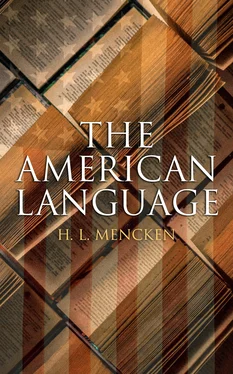The history of many of these Americanisms shows how vain is the effort of grammarians to combat the normal processes of language development. I have mentioned the early opposition to dutiable , influential , presidential , lengthy , to locate , to oppose , to advocate , to legislate and to progress . Bogus , reliable and standpoint were attacked with the same academic ferocity. All of them are to be found in Bryant's Index Expurgatorius 24( circa 1870), and reliable was denounced by Bishop Coxe as "that abominable barbarism" so late as 1886. 25Edward S. Gould, another uncompromising purist, said of standpoint that it was "the bright particular star ... of solemn philological blundering" and "the very counterpart of Dogberry's non-com ." 26Gould also protested against to jeopardize , leniency and to demean , and Richard Grant White joined him in an onslaught upon to donate . But all of these words are in good use in the United States today, and some of them have gone over into English. 27
Table of Contents
—A number of the foregoing contributions to the American vocabulary, of course, were simply common English words with changed meanings. To squat , in the sense of to crouch , had been sound English for centuries; what the colonists did was to attach a figurative meaning to it, and then bring that figurative meaning into wider usage than the literal meaning. In a somewhat similar manner they changed the significance of pond , as I have pointed out. So, too, with creek . In English it designated (and still designates) a small inlet or arm of a large river or of the sea; in American, so early as 1674, it designated any small stream. Many other such changed meanings crept into American in the early days. A typical one was the use of lot to designate a parcel of land. Thornton says, perhaps inaccurately, that it originated in the fact that the land in New England was distributed by lot. Whatever the truth, lot , to this day, is in almost universal use in the United States, though rare in England. Our conveyancers, in describing real property, always speak of "all that lot or parcel of land." 28Other examples of the application of old words to new purposes are afforded by freshet , barn and team . A freshet , in eighteenth century English, meant any stream of fresh water; the colonists made it signify an inundation. A barn was a house or shed for storing crops; in the colonies the word came to mean a place for keeping cattle also. A team , in English, was a pair of draft horses; in the colonies it came to mean both horses and vehicle.
The process is even more clearly shown in the history of such words as corn and shoe . Corn , in orthodox English, means grain for human consumption, and especially wheat, e. g. , the Corn Laws. The earliest settlers, following this usage, gave the name of Indian corn to what the Spaniards, following the Indians themselves, had called maíz . But gradually the adjective fell off, and by the middle of the eighteenth century maize was called simply corn , and grains in general were called breadstuffs . Thomas Hutchinson, discoursing to George III in 1774, used corn in this restricted sense, speaking of "rye and corn mixed." "What corn ?" asked George. " Indian corn ," explained Hutchinson, "or, as it is called in authors, maize ." 29So with shoe . In English it meant (and still means) a topless article of foot-wear, but the colonists extended its meaning to varieties covering the ankle, thus displacing the English boot , which they reserved for foot coverings reaching at least to the knee. To designate the English shoe they began to use the word slipper . This distinction between English and American usage still prevails, despite the affectation which has lately sought to revive boot , and with it its derivatives, boot-shop and bootmaker .
Store , shop , lumber , pie , dry-goods , cracker , rock and partridge among nouns and to haul , to jew , to notify and to heft among verbs offer further examples of changed meanings. Down to the middle of the eighteenth century shop continued to designate a retail establishment in America, as it does in England to this day. Store was applied only to a large establishment—one showing, in some measure, the character of a warehouse. But in 1774 a Boston young man was advertising in the Massachusetts Spy for "a place as a clerk in a store " (three Americanisms in a row!). Soon afterward shop began to acquire its special American meaning as a factory, e. g. , machine-shop . Meanwhile store completely displaced shop in the English sense, and it remained for a late flowering of Anglomania, as in the case of boot and shoe , to restore, in a measure, the status quo ante . Lumber , in eighteenth century English, meant disused furniture, and this is its common meaning in England today. But the colonists early employed it to designate timber, and that use of it is now universal in America. Its familiar derivatives, e. g. , lumber-yard , lumberman , lumberjack , greatly reinforce this usage. Pie , in English, means a meat-pie; in American it means a fruit-pie. The English call a fruit-pie a tart ; the Americans call a meat-pie a pot-pie . Dry-goods , in England, means "non-liquid goods, as corn" ( i. e. , wheat); in the United States the term means "textile fabrics or wares." 30The difference had appeared before 1725. Rock , in English, always means a large mass; in America it may mean a small stone, as in rock-pile and to throw a rock . The Puritans were putting rocks into the foundations of their meeting-houses so early as 1712. 31 Cracker began to be used for biscuit before the Revolution. Tavern displaced inn at the same time. As for partridge , it is cited by a late authority 32as a salient example of changed meaning, along with corn and store . In England the term is applied only to the true partridge ( Perdix perdix ) and its nearly related varieties, but in the United States it is also used to designate the ruffed grouse ( Bonasa umbellus ), the common quail ( Colinus virginianus ) and various other tetraonoid birds. This confusion goes back to colonial times. So with rabbit . Properly speaking, there are no native rabbits in the United States; they are all hares. But the early colonists, for some unknown reason, dropped the word hare out of their vocabulary, and it is rarely heard in American speech to this day. When it appears it is almost always applied to the so-called Belgian hare, which, curiously enough, is not a hare at all, but a true rabbit.
To haul , in English, means to move by force or violence; in the colonies it came to mean to transport in a vehicle, and this meaning survives in sound American. To jew , in English, means to cheat; the colonists made it mean to haggle, and devised to jew down to indicate an effort to work a reduction in price. To heft , in English, means to lift; the early Americans made it mean to weigh by lifting, and kept the idea of weighing in its derivatives, e. g. , hefty . Finally, there is the familiar American misuse of Miss or Mis' for Mrs. . It was so widespread by 1790 that on November 17 of that year Webster solemnly denounced it in the American Mercury.
Читать дальше












